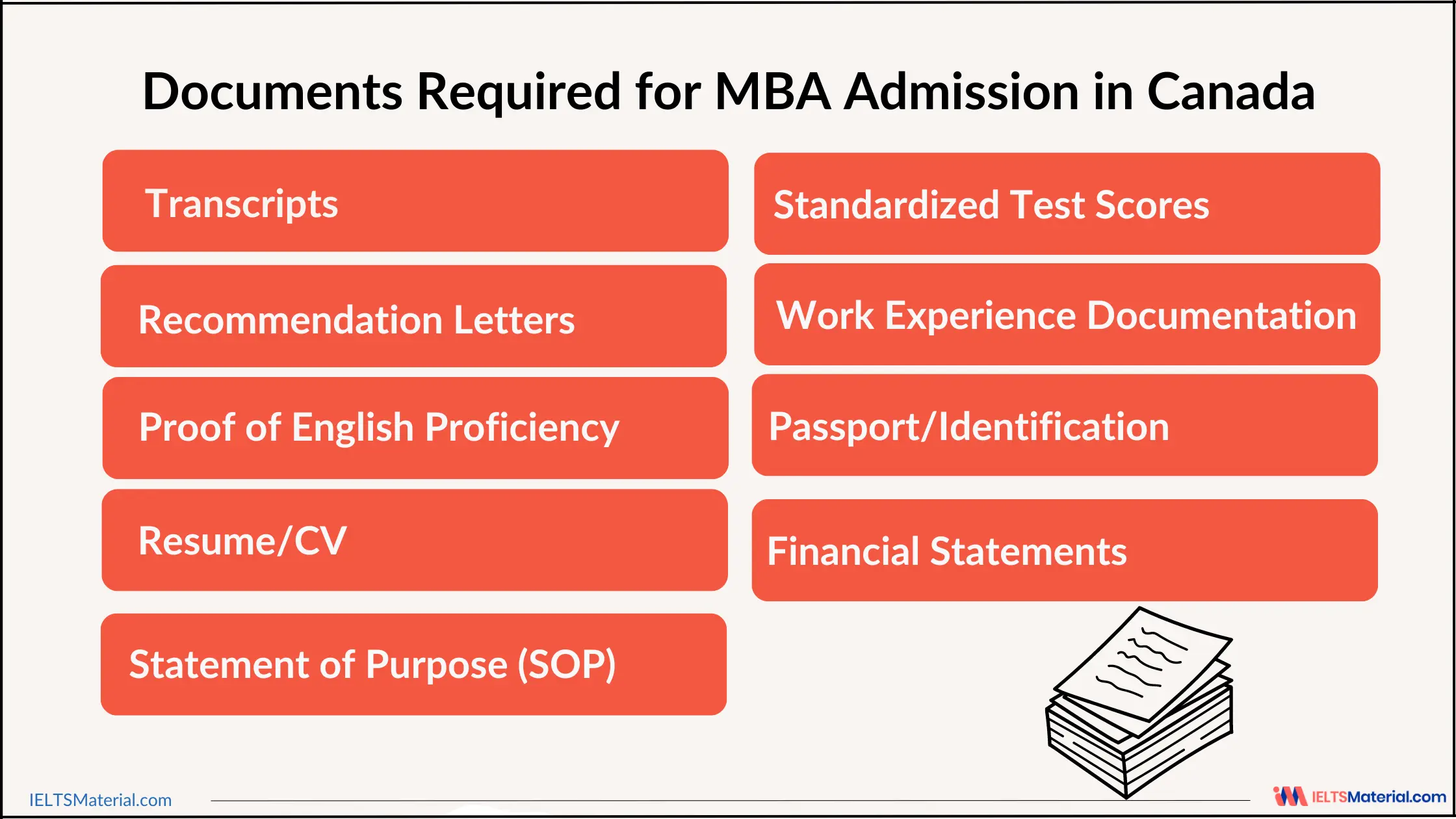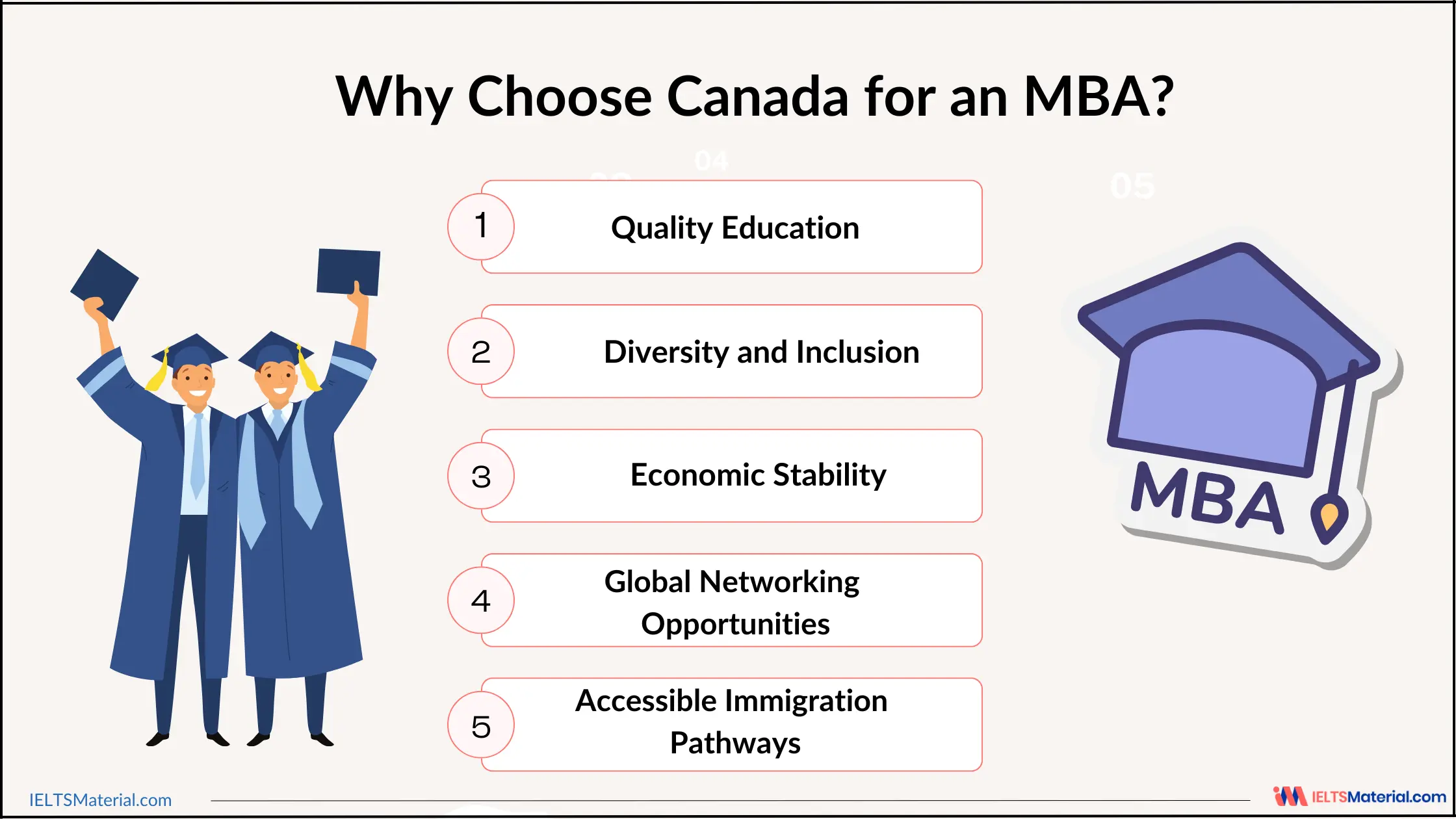MBA in Canada for Indian Students in 2025: Types, Requirements, Top Colleges & Jobs
10 min read
Updated On
-
Copy link
Planning to apply for an MBA in Canada? This guide delves into the MBA in Canada requirements for the best MBA colleges in Canada, along with important information on MBA cost in Canada, essential documents, and job prospects after completion.
Table of Contents
- Types of MBA in Canada
- Eligibility Criteria for MBA in Canada Requirements
- Documents Required for MBA Admission in Canada
- Admission Process for MBA in Canada
- Cost of Pursuing MBA in Canada for International Students
- Best MBA Colleges in Canada With Fees
- Job Opportunities After Completing MBA in Canada
- Why Choose Canada for an MBA?

Limited-Time Offer : Access a FREE 10-Day IELTS Study Plan!
Canada has emerged as a premier destination for pursuing an MBA, offering globally recognized programs, diverse cultural experiences, and promising career opportunities. Therefore, embarking on a journey for an MBA in Canada means opening doors to countless opportunities and challenges.
With top-ranked institutions worldwide, exciting career possibilities, and reasonable tuition fees, making the right decision is also necessary to avoid future hassles. So, in this blog, we will explore the types of MBA in Canada, the requirements for the best MBA colleges in Canada, as well as important information on MBA cost in Canada, essential documents, and job prospects after completion.
Types of MBA in Canada
Canada offers different MBA programs to cater to diverse student needs. It has MBA courses tailored to different career goals and lifestyles. Common types include Full-Time MBA, Part-Time MBA, and Executive MBA (EMBA). Let’s look at the table below for more details.
|
Type of MBA in Canada |
Duration |
Details |
|---|---|---|
|
Full-time MBA |
1-2 years |
|
|
Part-time MBA |
2.5-5 years |
|
|
Executive MBA (EMBA) |
13-20 months |
|
Eligibility Criteria for MBA in Canada Requirements
To be eligible for admission to an MBA program in Canada, candidates typically need to meet the following criteria:
1 Bachelor’s Degree: Applicants must hold a bachelor’s degree from a recognized institution. While most MBA programs accept degrees from various academic backgrounds, some may prefer candidates with a background in business or related fields.
2 Work Experience: Many MBA programs in Canada require applicants to have relevant work experience, typically ranging from two to five years. This work experience helps ensure that candidates have practical knowledge and skills that can contribute to their MBA studies.
3 Standardized Test Scores: Some MBA programs may require applicants to submit scores from standardized tests such as the Graduate Management Admission Test (GMAT) or the Graduate Record Examination (GRE). These tests assess skills in areas like critical thinking, quantitative reasoning, and verbal communication.
4 English Language Proficiency: Since English is the primary language of instruction in Canadian MBA programs, international applicants are often required to demonstrate proficiency in English. This is usually done through standardized tests like the International English Language Testing System (IELTS) or the Test of English as a Foreign Language (TOEFL).
5 Recommendation Letters: Admission committees for MBA programs often rely on recommendation letters from academic or professional contacts. These letters offer valuable perspectives on an applicant’s personality, abilities, and potential to thrive in the program.
6 Statement of Purpose: A well-written statement of purpose (SOP) is often required as part of the application process. The SOP allows applicants to articulate their academic and career goals, reasons for pursuing an MBA, and how the program aligns with their aspirations.
7 Interview: Some MBA programs may require applicants to participate in an interview as part of the admissions process. The interview allows admissions committees to assess applicants’ communication skills, professionalism, and fit for the program.
By meeting these eligibility criteria and submitting a strong application, prospective students can enhance their chances of admission to MBA programs in Canada. It’s essential to carefully review the specific requirements of each institution and program before applying.
Feeling unsure about how to clear the IELTS exam and achieve your target band score?
Book a free demo now!
Documents Required for MBA Admission in Canada
Ensuring you have all the necessary documents is crucial for a smooth MBA application process in Canada. Below, we’ll outline the essential documents you’ll need to prepare.

1 Transcripts: Official records of your academic performance from previous educational institutions, showcasing your grades, courses taken, and degrees earned. Most MBA programs in Canada require transcripts from all post-secondary institutions attended. Request official transcripts directly from your previous schools and ensure they are sent to the institutions you are applying to.
2 Recommendation Letters: Insight into your character, capabilities, and potential for success in an MBA program. Typically, MBA programs in Canada require two to three recommendation letters from academic or professional referees who can speak to your qualifications and strengths.
3 Proof of English Proficiency: Demonstrate proficiency in English, typically through standardized tests like IELTS or TOEFL. These tests assess English language skills in reading, writing, speaking, and listening. The minimum score needed for language tests like the IELTS/TOEFL can differ depending on the university.
4 Resume/CV: A comprehensive overview of your educational background, work experience, skills, achievements, and extracurricular activities. Tailor your resume/CV to highlight experiences and accomplishments relevant to the MBA program and your future career goals.
5 Statement of Purpose (SOP): Articulate your academic and career goals, reasons for pursuing an MBA, and how the program aligns with your aspirations. Showcase your passion for the field, unique qualities, and what you hope to contribute to the MBA community.
6 Standardized Test Scores: Assess your analytical, quantitative, and verbal reasoning skills, typically through tests like GMAT or GRE. Check specific requirements of each institution for accepted tests and minimum score requirements.
7 Work Experience Documentation: Some MBA programs require a minimum number of years of relevant professional experience. Provide documentation or certificates verifying your employment history and roles/responsibilities.
8 Passport/Identification: A copy of your passport or identification documents to verify your identity and citizenship status, ensuring eligibility requirements for studying in Canada.
9 Financial Statements: Provide evidence of financial ability to cover tuition fees, living expenses, and other costs. This may include bank statements or sponsorship letters demonstrating your ability to finance your education.
Gathering the required documents is essential to streamline your MBA application process. Once you have all the necessary paperwork in order, you’ll be well-prepared to submit your application and embark on your MBA journey in Canada.
Admission Process for MBA in Canada
Understanding the steps involved in the admission process for an MBA in Canada is crucial for prospective applicants. By following these steps, you can navigate the application process smoothly and increase your chances of securing admission to your desired program.
| Admission Process Step |
Description |
|---|---|
| Research and Selection | Explore MBA programs offered by Canadian institutions. Evaluate curriculum, faculty expertise, and campus culture. Attend informational sessions or virtual events for insights. |
| Application Preparation | Review application requirements and deadlines for chosen institutions. Gather necessary documents (transcripts, letters of recommendation, test scores). Craft a compelling statement of purpose (SOP). |
| Online Application Submission | Complete the online application form accurately. Double-check for errors or omissions. |
| Supporting Documents Submission | Submit required documents, including transcripts, letters of recommendation, and test scores, following the institution’s guidelines. |
| Interview Preparation | Prepare for potential interviews by practicing articulating goals, motivations, and experiences effectively. Be ready to discuss academic and professional background. |
| Deadline Adherence | Adhere to specific application deadlines set by institutions. Plan the application timeline and set reminders to avoid missing deadlines. |
| Follow-Up and Communication | Stay proactive by following up with admissions offices for questions or concerns. Keep track of communications and respond promptly. |
| Financial Planning | Remember to factor in the total cost, including tuition, living expenses, and potential financial aid options. Develop a comprehensive financial plan to afford education costs. |
| Acceptance and Enrollment | Review acceptance terms and conditions. Accept offers and submit enrollment deposits within deadlines. Follow the institution’s instructions for enrollment and registration. |
| Orientation and Onboarding | Participate in orientation programs and onboarding activities upon enrollment. Familiarize with campus resources, policies, and support services. Engage with peers, faculty, and alumni. |
Aspiring to Crack IELTS Exam with Expert Help to Fulfil MBA in Canada Requirements?
Attend Our FREE IELTS Webinars Now!
Cost of Pursuing MBA in Canada for International Students
The average tuition fees for an MBA program in Canada is between CAD 30,000 and CAD 40,000, which is seen as reasonable when compared to other study abroad nations. Besides this, international students have to consider the cost of living in Canada for making the right decision.
Best MBA Colleges in Canada With Fees
Here are the best MBA colleges in Canada for international students, along with their estimated fees and brief descriptions:
|
Top College for MBA in Canada |
Details |
Estimated Annual Fees (in CAD) |
|---|---|---|
|
Rotman School of Management, University of Toronto |
Renowned for its innovative curriculum and global perspective, Rotman School of Management offers a dynamic learning environment with access to cutting-edge research and industry connections. |
94,000 |
|
Schulich School of Business, York University |
Schulich School of Business is known for its diverse student body and experiential learning opportunities. With a focus on entrepreneurship and sustainability, it prepares students for leadership roles in a rapidly changing business landscape. |
85,000 |
|
Desautels Faculty of Management, McGill University |
Desautels Faculty of Management offers a rigorous academic curriculum combined with real-world experiential learning. It fosters a culture of innovation and collaboration, preparing graduates for success in the global marketplace. |
80,000 |
|
Ivey Business School, Western University |
Ivey Business School is renowned for its case-based learning approach and emphasis on leadership development. With a focus on practical skills and industry immersion, it equips students with the tools to excel in today’s competitive business environment. |
95,000 |
|
Smith School of Business, Queen’s University |
Smith School of Business offers a personalized learning experience with small class sizes and dedicated faculty. Its integrated curriculum combines academic rigor with hands-on experiential learning, preparing students for leadership roles in various industries. |
88,000 |
|
Alberta School of Business, University of Alberta |
Alberta School of Business is known for its strong focus on entrepreneurship and innovation. With state-of-the-art facilities and industry partnerships, it offers students valuable opportunities for networking and skill development. |
82,000 |
|
Sauder School of Business, University of British Columbia |
Sauder School of Business is recognized for its globally oriented curriculum and emphasis on sustainability and social responsibility. It offers a diverse range of specializations and experiential learning opportunities to meet the needs of today’s business leaders. |
87,000 |
|
DeGroote School of Business, McMaster University |
DeGroote School of Business offers a collaborative learning environment with a focus on innovation and leadership. Its integrated approach to education combines academic theory with practical experience, preparing graduates for success in a rapidly evolving business landscape. |
83,000 |
Join our expert-led classes to achieve your desired IELTS band score. Enroll Now!
Job Opportunities After Completing MBA in Canada
Exploring the diverse career paths available post-MBA in Canada is essential for making informed decisions about your professional future. Below, we’ll highlight some job opportunities and their average salaries after completing an MBA in Canada.
| Job Title | Average Salary (in CAD) |
|---|---|
| Financial Analyst | $70,000 -$90,000 |
| Marketing Manager | $80,000 – $100,000 |
| Business Development Manager | $90,000 – $110,000 |
|
Operations Manager |
$90,000 – $120,000 |
| Project Manager | $90,000 – $130,000 |
| Human Resources Manager | $80,000 – $100,000 |
| Management Consultant | $100,000 – $150,000 |
| IT Manager | $100,000 – $150,000 |
| Investment Banker | $100,000 – $150,000 |
|
Supply Chain Manager |
$90,000 – $110,000 |
Why Choose Canada for an MBA?
Canada is a top choice for MBA studies due to its esteemed education system, diverse culture, and robust economy, offering rich opportunities for career growth.

- Quality Education: Renowned Canadian universities provide a high standard of education with practical learning approaches, equipping students for leadership roles worldwide.
- Diversity and Inclusion: Canada’s multicultural society fosters a dynamic learning environment, promoting collaboration and cross-cultural understanding essential in today’s global business landscape.
- Economic Stability: With a strong and resilient economy, Canada offers abundant job opportunities and competitive salaries, making it an attractive destination for MBA graduates seeking career advancement.
- Global Networking Opportunities: Studying in Canada provides access to a diverse network of students, faculty, and industry professionals, fostering valuable connections and collaborations.
- Accessible Immigration Pathways: Canada offers various immigration pathways for international students, making it easier to transition from student to permanent resident after completing an MBA.
Overall, choosing Canada for an MBA provides students with access to world-class education, diverse career opportunities, and an enriching cultural experience, setting them on a path towards personal and professional success.
Additional Resources
Frequently Asked Questions
What are the qualifications required to pursue an MBA in Canada?
What are the requirements for admission to MBA programs in Canada?
Are there any prerequisites for enrolling in an MBA program in Canada?
What are the costs associated with pursuing an MBA in Canada?
Which universities in Canada offer the best MBA programs?
What are the job prospects for MBA graduates in Canada?
Can international students afford to pursue an MBA in Canada?
How long does it take to complete an MBA program in Canada?
Do Canadian MBA programs require work experience?
Is it possible to work part-time while pursuing an MBA in Canada?
We hope this guide has provided valuable insights into pursuing an MBA in Canada. With its esteemed education system, diverse culture, and promising job opportunities, Canada offers an ideal environment for advancing your career. Explore the possibilities and take the next step toward achieving your professional goals with an MBA from Canada.
Explore IELTS related articles

Start Preparing for IELTS: Get Your 10-Day Study Plan Today!
Explore other IELTS Articles

Haniya Yashfeen

Haniya Yashfeen
Recent Articles

Nehasri Ravishenbagam

Nehasri Ravishenbagam

Haniya Yashfeen







Post your Comments